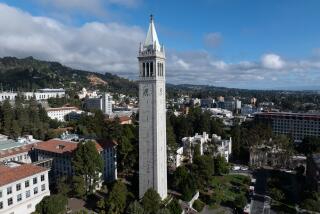3 Professors Discuss Mideast Peace Challenges : Academia: ‘It’s like the Wild West there,’ one of the Hebrew University educators tells a crowd of 150. Competition for water and power sharing are among the issues addressed.
- Share via
NEWPORT BEACH — A prominent Israeli professor said Sunday that the massacre of nearly 50 Muslims by a Jewish settler in a Hebron mosque underscores the need to disarm some Jewish settlements in the Israeli-occupied West Bank and Gaza Strip for peace in the region to have a chance.
“It’s like the Wild West there. The Israeli Army has given arms to the settlers and also given them free reign,” said Avraham Sela, a visiting professor teaching Middle East history at San Diego State University.
Sela said the “irreversible peace process has begun” and Israel must control the violence within its own borders, just as it demands the same from other nations such as Jordan, Lebanon and Syria. He said the army should ensure order after some settlements are disarmed.
Speaking to 150 people gathered at a movie theater in Newport Beach, Sela was one of three Israeli professors from the Hebrew University in Jerusalem who discussed some of the obstacles and offered some solutions to achieve peace in the Middle East.
The academic conference, titled “The Challenges of Peace,” was sponsored by the American Friends of the Hebrew University, Pacific Southwest Region.
Hillel Shuval, a professor of environmental engineering who is a visiting professor at Harvard University, told the audience during the two-hour conference about an emerging conflict over water in the region.
For years, Israeli farmers have used water from mountain ranges in the West Bank that now belong to the Palestinians.
“Who has rights to the water now? How can an agreement between the two be worked out?” Shuval asked.
Using dams and building waterways, Arabs and Jews together can increase the water supply in the region and create a “win-win” situation for both sides to avoid further tensions, Shuval said.
But money for water projects and a willingness to sit down face-to-face are required for any progress, he said.
Shuval said that accommodations must be made for peace to work. “Israel must recognize the needs of the Palestinians. And one thing they need is more water,” Shuval said.
Shlomo Hasson, a professor of social geography, said the future of peace in Israel’s capital city, Jerusalem, depends on sharing power among the diverse ethnic and religious communities.
Even within Jerusalem’s Jewish population, Hasson said there are vast differences among secular, ultra-orthodox and Sephardic Jews who live in separate parts of the city and maintain vastly different lifestyles.
Hasson said Jerusalem must eventually incorporate all Arabs and Jews into government, offering leadership positions within the local power structure. He said the steady increase of ultra-orthodox Jews in Jerusalem poses a threat to peace because they believe Jewish law must be incorporated into the city’s laws.
At one point during the conference, the audience broke into applause when Shuval said Israel desperately needs a bill of rights to protect the freedom of religion in Israel similar to the U.S. Bill of Rights.
“We must have a bill of rights as protection for everyone,” Shuval said.
Sunday’s conference, which included charts and diagrams projected onto the large movie screen, was a valuable educational experience for Newport Beach resident Kivie Moldave.
“I thought today was good because they recognized the needs and aspirations of Palestinians in Israel. With innovation and hard work, the differences can be resolved as long as both sides are reasonable. It can be done,” Moldave said.
More to Read
Sign up for Essential California
The most important California stories and recommendations in your inbox every morning.
You may occasionally receive promotional content from the Los Angeles Times.













